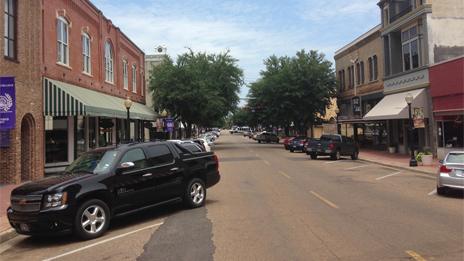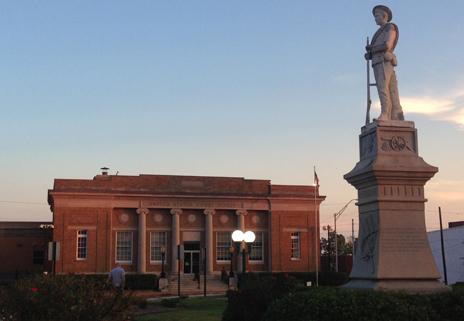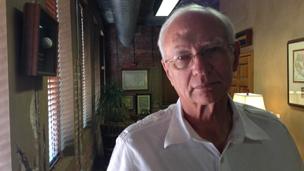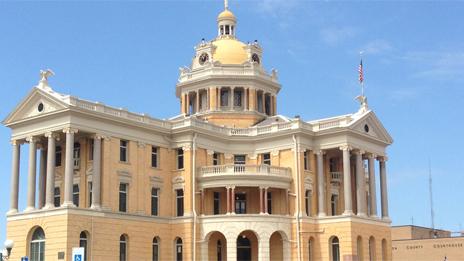The sleepy town kept busy with $2m-a-day patent cases
- Published
- comments

It's a small town 150 miles to the east of Dallas, with a certain sleepy charm. Its 25,000 inhabitants boast that it was the birthplace of boogie-woogie, played an important role in the Civil War, and was at the centre of the development of the Texas Pacific railroad. But why would I - or anyone else, for that matter - want to spend time in Marshall, Texas?
"You're here for the rocket docket," guessed Geraldine Mauthe, when I popped into the Marshall Conference and Visitor Bureau on my arrival. And she was right - the rocket docket refers to the speedy system (and speedy is relative) for dealing with patent cases which has made this small town's court famous or feared, depending on whether you're a plaintiff or a defendant.
I had come to Marshall as part of a Radio 4 investigation into what has gone wrong with the US patent system. For this town at the centre of the Texas Eastern District is now one of the world's busiest places for patent litigation.
As Palo Alto and Mountain View are to software engineers, so is Marshall to patent lawyers - a place where you can be sure of plenty of business.
Two of the town's most prominent attorneys, Michael Smith and Sam Baxter, acted as my guides to the place and its premier industry. Mr Smith acts mainly for defendants, Mr Baxter principally for the plaintiffs, but each has built a pretty lucrative business on patent litigation.
As we stood on the main square, looking across at the old courthouse, Mr Smith explained that it all started with a local company, the semiconductor maker Texas Instruments.
"They were looking for a place where they could get patent claims heard. And the federal courts in Dallas were buried under a lot of drug trials."
So they came to Marshall for a speedier hearing. "They filed the cases here for about 10 years and they were very happy with it. And then everyone else followed suit."

It was what the locals call a triple digit day, when temperatures soar above 100F (37.8C), so I was grateful to step into the air conditioned former 1930s garage which houses Mr Baxter's law offices.

Sam Baxter: "The meter's running on every lawyer"
Right next door to the courthouse, this lovingly restored building with its exposed brick walls and wooden floors becomes a hive of activity when a trial is on.
"We have about 50 people working on a case," he explained. "We have a kitchen to feed them all, we have our own graphics people doing all the graphics for the trial - it's sort of a cottage industry. "
And that doesn't come cheap for either side in a patent case. It can cost anything from $6m to $12m for a trial, says Mr Baxter. "If you got that many lawyers in a courtroom and the meter's running on every one of them, it is probably not unusual for the clock to be running at $2m a day in a courtroom."
No wonder, then, that many smaller companies just agree to pay a licensing fee rather than ever get involved in a patent case. But for Marshall, the regular influx of as many as 100 lawyers for one of the big cases has been a boon. The fine old 1900 county courthouse has been restored, and is being used again when the regular state court across the road is occupied.
Many of the town's office buildings are used by dozens of so-called patent trolls - companies that exist merely to litigate and find it useful to have an address - though no meaningful operations - in the district where they seek to bring cases.

The restored county court house
One evening I got talking to some locals in a restaurant on the main square, one of just two places you can drink alcohol in Marshall - once you show your driving licence and sign up to be a member of a club. It was boogie-woogie night, and although it was quieter than normal because the judge was out of town and no patent cases were underway, there was a decent crowd.
Just about everyone I met had some involvement with the patent business, mainly as jury members. They were all quite proud of their town and seemed bemused that anyone might think the patent system was not working well for the US. And of course there is an economic benefit.
"It's good for hotels, it's good for restaurants, it's good for lawyers," one man told me.
But one of those lawyers, Mr Baxter, said there was more to Marshall's passion for patents than just self-interest. In this part of the country, respect for property rights was very strong - and the argument that many patents were now owned by people who litigate rather than invent products held no sway for him.
"If you bought a piece of property that is real estate, and it turns out that it's got oil or gas underneath, nobody ought to be able to tell you that you can't take advantage of that."
In a state which has built its fortune on oil, the very idea that you could not exploit a piece of property like a patent was "anathema to the free enterprise culture".
On my visit to Marshall, I found only one dissident when it came to the patent industry.
In the town's computer supplies store, I asked the young owner the same question I put to everyone I met here - what makes this town famous? "Slavery? Religious ignorance? Nutbaggery?" were his first guesses, indications perhaps that he didn't quite fit in.
And when I mentioned the patent business, he said he hoped the town was not proud of that - it might be good for business but it wasn't good for the overall economy "because you've got companies being sued into oblivion".
That view of a system which has seen patent litigation soar in recent years is now gaining wider acceptance in Washington DC, where politicians right up to President Obama are talking of reforms. But in Marshall, where a patent is a piece of property to be defended with every means possible, and $2m-a-day lawsuits are fought just about every week, most people hope that reform doesn't arrive any time soon.
Patently Absurd is on BBC Radio 4 on Tuesday 20 August at 20:00 BST, or catch up with iPlayer